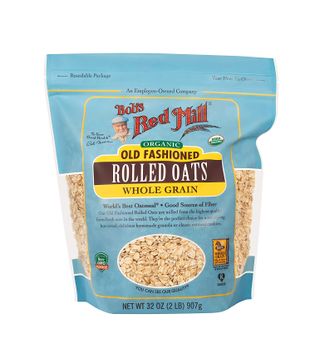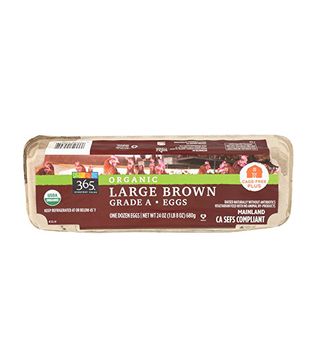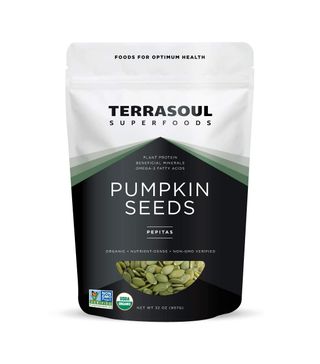The Better-Mood Diet: 7 Foods That Can Make You Feel Happier


Ever feel like you're searching for happiness in a sea of terrifying news alerts? Us too. While we can't do anything about the news, we can tell you that there are certain foods that can help boost your mood. Yes, you can eat your way to happiness. We spoke to Robert Zembroski, DC, DACNB, MS, author of Rebuild, and Nicole Centeno, the founder of Splendid Spoon, to see which foods they recommend you eat when you're feeling down.
The below foods are filled with essential nutrients that support your brain function, manage stress, and just generally make you happier—like the kind of happiness you feel after snuggling a really cute puppy. Press Ctrl+Z on your blah mood with these happiness-inducing foods.
1. Oatmeal
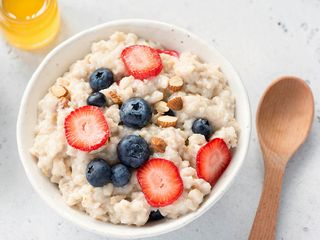
"Carbohydrates boost the production of serotonin in our bodies," Centeno says. Anyone who has ever downed a sleeve of Oreos can attest to this. But instead of fast-burning carbs, which can cause a sugar crash, she recommends opting for a complex carb, like oatmeal.
2. Eggs

"Eggs contain the vitamin-like essential nutrient choline, which is needed to produce the neurotransmitter acetylcholine involved in memory, information processing, language, and muscle control," Zembroski says. "A deficiency of choline and the resulting deficiency of acetylcholine can cause memory loss, agitation, learning disorders, dementia, and a lack of creativity."
3. Pumpkin Seeds
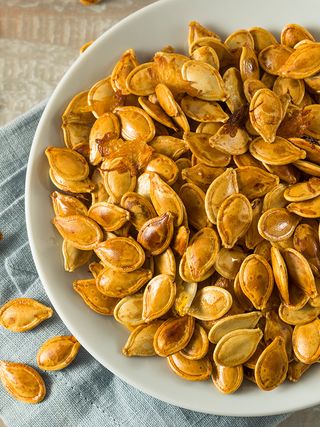
Pumpkin seeds are basically like tiny little balls of magnesium. They're loaded with the stress-reducing mineral. "Magnesium is a key component to combatting the blues," Centeno says. Bonus: They also contain tryptophan, which helps boost serotonin production.
4. Grass-Fed Beef

"An excellent source of protein, beef and other lean meats also provide us with the amino acid tyrosine, which is needed for the production of dopamine, the neurotransmitter that gives us energy, excitement, power, and our ability to move. It also enhances brain signaling, thus improving attention and focus," Zembroski says. "When we don't consume enough tyrosine, the reduction in dopamine production can cause ADD, hyperactivity, obesity, addictions, and fatigue."
5. Sea Vegetables

"Anyone suffering from depression should consider eating kelp, seaweed, and spirulina. Here's why: Sea vegetables provide the amino acid tryptophan, which is needed to produce the neurotransmitter serotonin. In turn, serotonin becomes the sleep hormone melatonin. Serotonin also provides excitement, enthusiasm, joy, and social engagement," Zembroski explains. "A deficiency of serotonin is linked to depression, sugar cravings, poor sleep, PMS, and sadness."
6. Grass-Fed Whey Protein

"Glutamine is the most abundant amino acid in muscles. We need it to improve and maintain muscle size and strength and to produce the anti-anxiety neurotransmitter gamma-aminobutyric acid (GABA)," Zembroski says. GABA helps calm your nervous system. When you're deficient in GABA, it can lead to anxiety, OCD, and restlessness. "Grass-fed whey protein is an excellent source of glutamine. It is readily available and a great protein source for your post-workout shake," Zembroski says.
If you don't do protein shakes, he says other ideal sources of glutamine are low-mercury fish, organic chicken, eggs, walnuts, and wheat germ.
7. Nuts
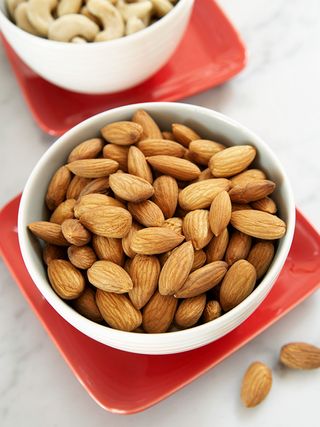
As if we needed another reason to slather almond butter on everything. "Walnuts and almonds are excellent sources of omega-3 fatty acids," Zembroski says. "Omega-3s are essential for the proper function of the neurotransmitters that control the brain. These fatty acids are needed to support the movement of serotonin and dopamine within the nervous system. Without enough omega-3 fatty acids, neurotransmitter function suffers, thus predisposing us to feelings of depression, anxiety, fatigue, and mood swings. There is a reason why walnuts look like the brain."
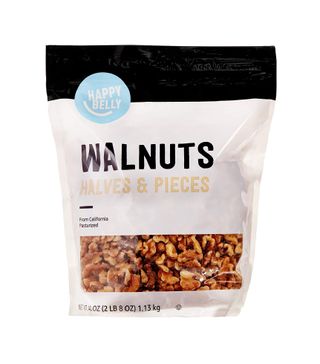
Next up: 12 of the Best Plant-Based Even Non-Vegetarians Should Eat
This article was originally published at an earlier date and has since been updated.
Disclaimer
This article is provided for informational purposes only and is not intended to be used in the place of advice of your physician or other medical professionals. You should always consult with your doctor or healthcare provider first with any health-related questions.
-
 It's Time to Get Our Nutrition in Check for Summer—This App Is Making It Easy
It's Time to Get Our Nutrition in Check for Summer—This App Is Making It EasyThe recipe ideas are endless.
By Who What Wear
-
 I Only Ate Sakara Life Meals for 30 Days—Here Are 7 Things That Happened
I Only Ate Sakara Life Meals for 30 Days—Here Are 7 Things That HappenedThe brand's 30-Day Fall Reset is finally here.
By Erin Jahns
-
 The 6 Warning Signs You're Not Getting Enough Protein
The 6 Warning Signs You're Not Getting Enough ProteinAnd what to eat to up your intake.
By Sarah Yang
-
 Everything This Professional Ballet Dancer Eats to Fuel Her For Performances
Everything This Professional Ballet Dancer Eats to Fuel Her For PerformancesHer grocery staples include high-quality French butter.
By Candice Aman
-
 These 8 Foods Are the Worst for Rosacea—Here's What to Eat Instead
These 8 Foods Are the Worst for Rosacea—Here's What to Eat InsteadControl those flare-ups.
By Sarah Yang
-
 15 Things That Cause Bloating and How to Get Rid of It ASAP
15 Things That Cause Bloating and How to Get Rid of It ASAPTry these.
By Sarah Yang
-
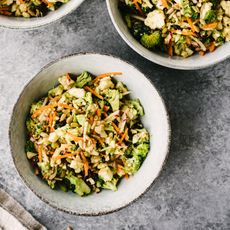 Is the Alkaline Diet Overhyped? What Experts Want You to Know
Is the Alkaline Diet Overhyped? What Experts Want You to KnowHere's how it works.
By Sarah Yang
-
 I'm an Imperfect Dietitian and My Key to Eating Healthy Meals Is Convenience
I'm an Imperfect Dietitian and My Key to Eating Healthy Meals Is ConvenienceTake a peek at my weekly grocery staples.
By Candice Aman
